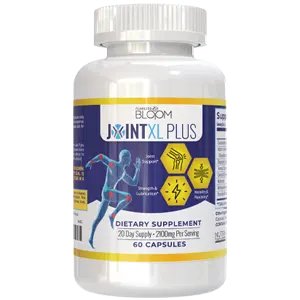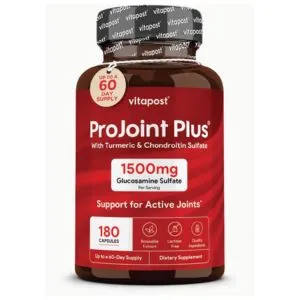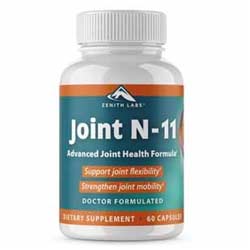Joint pain is an unpleasant feeling that makes it impossible to perform anything without being concerned about the pain.
There are a number of natural substances that can help relieve discomfort and treat the underlying cause. These vitamins for joint pain include natural ingredients that have been shown to provide relief and improve mobility.
The best natural supplement should not be a slew of vitamins and minerals [1], but rather a blend of components that will lubricate the joint for pain-free movements while also alleviating your discomfort.
It should also be able to slow the course of joint damage by reducing the inflammatory pathway, which is one of the main causes of arthritis.

Vitamins for Joint Pain and Natural supplements can be as effective – if not more – as anti-inflammatory drugs. Before taking any, talk to your doctor and review research and safety reports.
Here at Consumer Reviews, we’ve evaluated hundreds of products through a scientific lens to assure you’re developing a safe and effective joint pain regimen. This article will help you find the best joint pain supplement for you.
What Are Vitamins for Joint Pain?
Several nutritional supplements have shown promise in the treatment of pain, stiffness, and other symptoms of conditions such as arthritis. Natural products such as Glucosamine and Chondroitin, Omega-3 Fatty Acids, SAM-e, and Curcumin have all been researched for osteoarthritis (OA) and rheumatoid arthritis (RA).
Some of these natural remedies may help relieve arthritic symptoms, especially when used with standard therapy. Here’s the science behind some of the most popular supplements for arthritis treatment, as well as how they function.
See Our Expert Recommended Top Joint Health Supplement
Popular Supplements for Joint Pain
Learn which supplements and vitamins might help with arthritis joint pain symptoms, and what risks some can pose.
Glucosamine and Chondroitin

Glucosamine and chondroitin are two of the most commonly used supplements for arthritis. They’re components of cartilage—the substance that cushions the joints.
Research on these supplements has been mixed, in part because studies have used varying designs and supplement types. A large National Institutes of Health study called the GAIT trial compared Glucosamine and Chondroitin, alone or together, with an NSAID and inactive treatment (placebo) in people with knee osteoarthritis (OA).
Glucosamine improved symptoms like pain and function, but not much better than a placebo. Yet a 2016 international trial found the combination to be as effective as the NSAID celecoxib at reducing pain, stiffness, and swelling in knee OA.
Studies have also differed on which form of the supplements is most effective. Some evidence suggests glucosamine sulfate is best. Others find glucosamine hydrochloride to be more effective. One study that compared the two forms head to head showed they offered equivalent pain relief. Mayo Clinic researchers say the evidence supports trying glucosamine sulfate – not hydrochloride – with or without chondroitin sulfate for knee OA.
Fish Oil

The polyunsaturated omega-3 fatty acids found in fish have potent anti-inflammatory properties. “Omega-3 fats seem to work better for rheumatoid arthritis than for osteoarthritis, most likely because rheumatoid arthritis is mainly driven by inflammation,” says Chris D’Adamo, Ph.D., Director of Research & Education at the University of Maryland School of Medicine Center for Integrative Medicine.
A 2017 systematic review of studies found that omega-3 supplements reduced joint pain, stiffness, and swelling in RA. Taking these supplements might help some people cut down on their use of pain relievers — and avoid their side effects. “For mild cases of arthritis, it may be better to reach for the supplements before you go for the ibuprofen,” says Farshad Fani Marvasti, MD, MPH, director of Public Health, Prevention, and Health Promotion at The University of Arizona. Omega-3s have the added benefit of protecting against heart disease and dementia, he says.
Plant-based sources such as flax and chia seeds also contain omega-3s, but in the form of short-chain alpha-linolenic acid (ALA). “It’s the long-chain omega-3 fatty acids — eicosapentaenoic acid (EPA) and docosahexaenoic acid (DHA) — that have the majority of the health benefits,” D’Adamo says. When you buy fish oil, make sure the supplement lists the EPA and DHA content, and that you take at least one gram each of EPA and DHA, he adds. Vegans can get these omega-3s from an algae-based supplement.
In A HURRY? Take A Look At Our Editor’s Pick Instead!
SAM-e

S-adenosyl-methionine (SAM-e) is a natural compound in the body that has anti-inflammatory, cartilage-protecting, and pain-relieving effects. In studies, it was about as good at relieving OA pain as NSAIDs like ibuprofen and celecoxib, without their side effects.
SAMe shows promise in the treatment of osteoarthritis of the knee or hip. It is said to relieve pain and have anti-inflammatory properties, and some research suggests that it may promote cartilage repair.
SAM-e has a bonus benefit, too. “The supplement is most useful when you also have depression because it has a mild to moderate antidepressant effect,” Marvasti says.
The typical SAM-e dose is 1,200 mg daily. If you plan to try this supplement, be patient. “It’s going to take a few weeks to see the full effects,” D’Adamo says.
Curcumin

Curcumin is the active compound in the yellow-hued spice, turmeric, which is a staple of Indian curries. In the body, it acts as a powerful anti-inflammatory agent, blocking the same inflammation-promoting enzyme as the COX-2 inhibitor drug, celecoxib.
In a study of 367 people with knee OA, a 1,500 mg daily dose of curcumin extract was as effective as 1,200 mg a day of ibuprofen, without the gastrointestinal side effects. This supplement also appears to relieve RA swelling and tenderness.
One downside to curcumin is that it’s hard for the body to absorb. “You want to take it with a source of fat. Some of the supplements will be in an oil base, which is really important,” D’Adamo says.
Black pepper also increases absorption. Some supplements add black pepper extract, piperine. However, piperine could potentially cause liver damage, and it can increase the absorption of medications like carbamazepine (Tegretol) and phenytoin (Dilantin), making them more potent.
Vitamins

Several vitamins have been studied for their effects on arthritis, including the antioxidant vitamins A, C, and E, and vitamins D and K. So far there’s no evidence that taking antioxidant vitamins improves arthritis symptoms, although eating a diet rich in these nutrients is healthy overall.
Vitamins D and K are both important for bone strength, and vitamin K is involved in cartilage structure. Supplementing these two nutrients may be helpful if you’re deficient in them.
Vitamin D is not a vitamin, but it is a pro steroid hormone. Humans can make vitamin D if they are exposed to the right ultraviolet light. However, most of my patients over age 50 are low in vitamin D (on blood testing with a 25-hydroxy vitamin D test).
If you have joint pain consider starting 1,000 to 2,000 units of vitamin D per day and/or have your physician check your level.
Top Joint-Boosting Ingredients
With extensive research, we uncovered the critical ingredients for real joint health results. These nutrients have been clinically proven to manage joint discomfort, improve mobility, boost cognitive function, and support overall health.
- Glucosamine: Glucosamine is a naturally occurring component of cartilage, a material that keeps bones from brushing against one another, causing discomfort and irritation[2]. It may also help to reduce cartilage deterioration, which can occur as a result of arthritis.
- Chondroitin: Chondroitin like Glucosamine, is a cartilage building block. It may also aid in the prevention of cartilage degradation caused by osteoarthritis[3]. Long-term use of chondroitin sulfate may help to decrease the development of osteoarthritis. When administered for up to two years, studies demonstrate that it delays the shrinking of the joint space. They are frequently combined in joint supplements. However, it’s still uncertain if taking a combination supplement is better than taking one vitamin at a time[3].
- Boswellia Serrata: Used in traditional remedies for thousands of years, this tree extract helps curb discomfort by moderating our bodies’ natural inflammatory responses. Clinical studies show Boswellia can start easing joint discomfort after just 2 months.[8]
- Boswellia Extracts: Boswellia Extracts have been found in clinical tests to relieve pain feelings more than a placebo.[4]
Tips For Choosing Vitamins For Joint Pain
With so many options, choosing a vitamin to help with joint discomfort may be difficult. A lot of these items have a lot of different components in them. Keep in mind that a big list of ingredients does not always imply a superior product. Also, because these goods are not regulated by the FDA in the United States, read labels carefully.
In certain circumstances, adding nutrients hasn’t been shown to improve joint health. Others, such as glucosamine and chondroitin, may include numerous therapeutic substances. However, there isn’t much evidence that taking multiple-ingredient supplements is more beneficial than taking a single-ingredient supplement.
Furthermore, several of these products contain insufficient amounts of one or more components to be useful before you choose a supplement, tell your doctor or pharmacist about any other prescriptions you’re taking so they can rule out any possible interactions. Certain drugs, such as blood thinners, may interact with joint health supplements.
How to Take Supplements Safely?
Always check with your doctor before you try any new supplement to make sure that it’s right for you, and that you’re taking a safe dose.
“I do recommend for the consumer who’s anticipating using a lot of supplements either to find an integrative physician who can help them or invest in a [subscription with an] independent testing company like Consumer Labs and check with their physician,” Marvasti advises. Also, go through your entire supplement and medication list with your pharmacist to check for possible interactions.
Healthy joints allow us to move with ease. Joint damage can cause pain preventing you from doing the things you once loved. From aging to untreated sports injuries – many conditions lead to joint pain. A quality joint product may help reduce inflammation, repair existing tissue damage, and promote stronger joints, lessening susceptibility to future degeneration.
Below you’ll find some of the most effective joint pain supplements on the market today, in our opinion.
Our Top Vitamins For Joint Pain Choices*
ConsumerReviews.tv is dedicated to bringing you the best products with the most effective ingredients. Our unique Review Ranking Platform combines our personal experience with online reviews and opinions from over 100 independent review websites.
**This is a subjective assessment based on the strength of the available informations and our estimation of efficacy.
*Result may vary. If you are pregnant, nursing, have a serious medical condition, or have a history of heart conditions we suggest consulting with a physician before using any supplement. The information contained in this website is provided for general informational purposes only. It is not intended to diagnose, treat, cure, or prevent any disease and should not be relied upon as a medical advice. Always consult your doctor before using any supplements.
*Disclosure of Material connection: Some of the links in the post above are “associate sales links.” This means if you can click on the link and purchase an item, we will receive a commission. Regardless, we only recommend products or services which we use personally and/or believe will add value to our readers. We are disclosing this in accordance with the Federal Trade Commission's 16 CFR, Part 255: “Guides Concerning the Use of Endorsements and Testimonials.









